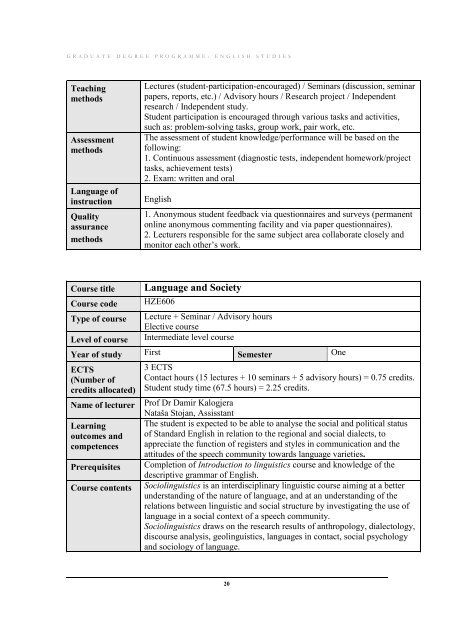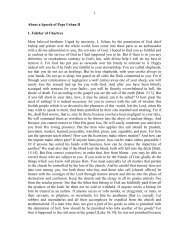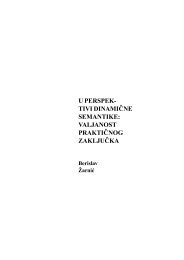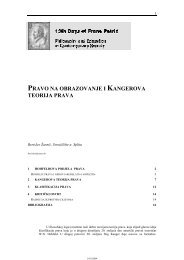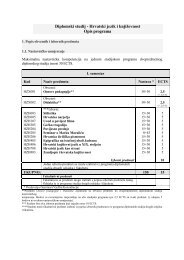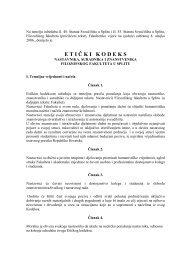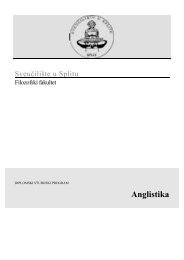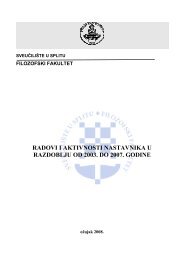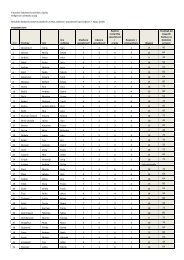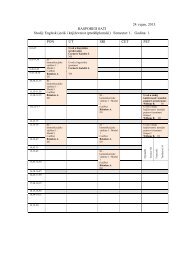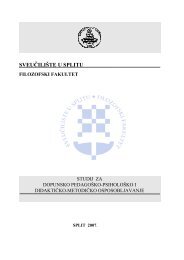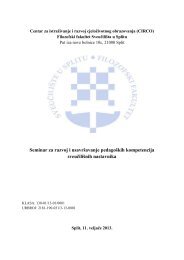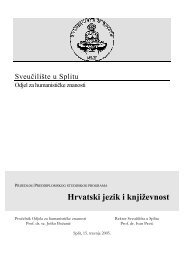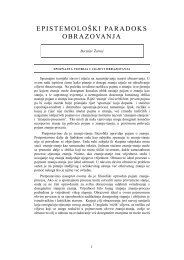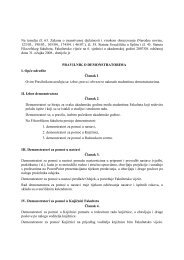English Studies
English Studies
English Studies
You also want an ePaper? Increase the reach of your titles
YUMPU automatically turns print PDFs into web optimized ePapers that Google loves.
G R A D U A T E D E G R E E P R O G R A M M E : E N G L I S H S T U D I E S<br />
Teaching<br />
methods<br />
Assessment<br />
methods<br />
Language of<br />
instruction<br />
Quality<br />
assurance<br />
methods<br />
Lectures (student-participation-encouraged) / Seminars (discussion, seminar<br />
papers, reports, etc.) / Advisory hours / Research project / Independent<br />
research / Independent study.<br />
Student participation is encouraged through various tasks and activities,<br />
such as: problem-solving tasks, group work, pair work, etc.<br />
The assessment of student knowledge/performance will be based on the<br />
following:<br />
1. Continuous assessment (diagnostic tests, independent homework/project<br />
tasks, achievement tests)<br />
2. Exam: written and oral<br />
<strong>English</strong><br />
1. Anonymous student feedback via questionnaires and surveys (permanent<br />
online anonymous commenting facility and via paper questionnaires).<br />
2. Lecturers responsible for the same subject area collaborate closely and<br />
monitor each other’s work.<br />
Course title Language and Society<br />
Course code HZE606<br />
Type of course Lecture + Seminar / Advisory hours<br />
Elective course<br />
Level of course Intermediate level course<br />
Year of study First Semester One<br />
ECTS<br />
(Number of<br />
credits allocated)<br />
3 ECTS<br />
Contact hours (15 lectures + 10 seminars + 5 advisory hours) = 0.75 credits.<br />
Student study time (67.5 hours) = 2.25 credits.<br />
Name of lecturer Prof Dr Damir Kalogjera<br />
Nataša Stojan, Assisstant<br />
Learning The student is expected to be able to analyse the social and political status<br />
outcomes and of Standard <strong>English</strong> in relation to the regional and social dialects, to<br />
competences appreciate the function of registers and styles in communication and the<br />
attitudes of the speech community towards language varieties.<br />
Prerequisites Completion of Introduction to linguistics course and knowledge of the<br />
descriptive grammar of <strong>English</strong>.<br />
Course contents Sociolinguistics is an interdisciplinary linguistic course aiming at a better<br />
understanding of the nature of language, and at an understanding of the<br />
relations between linguistic and social structure by investigating the use of<br />
language in a social context of a speech community.<br />
Sociolinguistics draws on the research results of anthropology, dialectology,<br />
discourse analysis, geolinguistics, languages in contact, social psychology<br />
and sociology of language.<br />
20


